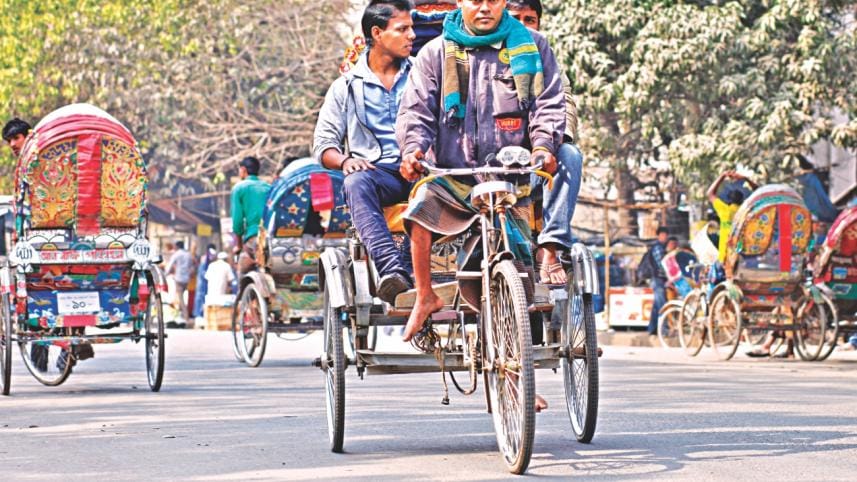Great effort, yet some concern

Begging is not what Shahidul Islam wanted to do for a living. In fact, he always considered this particular way of making a living disgraceful, and wanted to earn his livelihood through decent means.
But a typhoid fever in early childhood left his right leg crippled, forcing this poor man to seek alms on the streets of the capital city for the last 15 years.
However, Shahidul struggled over the years saving money from whatever he got from begging, and finally succeeded in putting an end to his life as a beggar.
On January 22, he bought a battery-run rickshaw with the savings and started driving it himself.
“Now I feel very good because I am earning my living,” he told this correspondent while taking him to the High Court area from Shahbagh in his vehicle on January 26.
When this correspondent asked him if he knew that plying of battery-run rickshaws was illegal, he said he was aware of it. “Police haven't stopped me yet. If they do, I will tell them that I am a physically challenged man and I am driving this rickshaw to get out of begging.”
Although Shahidul's endeavour to eke out a living by running a battery-run rickshaw is commendable, concerns remain over the safety of the passengers taking a ride on his vehicle.
Son of late Altaf Hossain Khalifa of Gonipur village in Joypurhat's Akkelpur upazila, Sahidul is second among his three siblings. He lost the use of his right leg due to typhoid when he was just a one-year-old. He studied up to class-IX. His father died in a road accident in 2004.
Hard pressed by poverty, he came to Dhaka in 2000 and started begging in different parts of the city. He lives in a slum in Kamrangirchar area.
“I've seen many physically-challenged people pulling rickshaws and I talked to some of them,” said 34-year-old Sahidul.
“I told them that I am a young man, yet I am doing [begging] this. I felt ashamed and wanted to work.”
One Raju, who is also physically challenged and pulls a rickshaw, helped him find a man from whom he bought the battery-run rickshaw.
Shahidul bought the vehicle for Tk 48,000 from one Yunusur Rahman of Kamrangirchar. He gave Yunusur Tk 10,000 as one-time down payment and would pay the rest of the money by giving Tk 300 per day.
“Earlier, I received a one-day training on rickshaw driving and started running it from Friday [January 22],” said Sahidul, father of three, two of whom are school-goers.
Yunusur said, “I have five rickshaws and I rent those out to people. I had no plan to sell any of them but I sold him one as he told me that he wanted to get out of begging.”
Sahidul, the lone breadwinner of his five-member family, used to earn Tk 150 to Tk 250 daily from begging. Now he earns Tk 450 to Tk 500. “I am very happy now,” he said with a big smile on his face.
Towards the end of the conversation with him near the High Court, one Mamun Hossain arrived there looking for a rickshaw.
After knowing about Shahidul, Mamun praised him for leaving begging behind but raised questions about his ability to control the vehicle on the busy streets of Dhaka.
He said riding a rickshaw by a physically-challenged person can pose risk of serious accidents for both the passenger and him. He also suggested that Shahidul should better consider doing small business rather than running a rickshaw.
Shahidul, however, said he does not face any difficulty in manoeuvring the vehicle.
Tanvir Ahmed, associate coordinator of the Centre for Disability in Development, an organisation working for people with disabilities, said that battery-run rickshaws are illegal on the streets. But when a physically challenged man runs the vehicle, it is a special case and the authorities should give it special consideration.
If he was not allowed to drive the rickshaw, he might return to begging. So, his condition should be considered “specially” or he should be given an alternative job, Tanvir told The Daily Star.
He said there was no exact number of physically challenged people in the country. However, the Department of Social Services in 2013 conducted a survey to count the number of people with disabilities, but the results have not been released yet.
As per a 2005 survey of National Forum of Organisations Working with the Disabled, 5.6 percent of the total population was disabled, he added.




 For all latest news, follow The Daily Star's Google News channel.
For all latest news, follow The Daily Star's Google News channel.
Comments